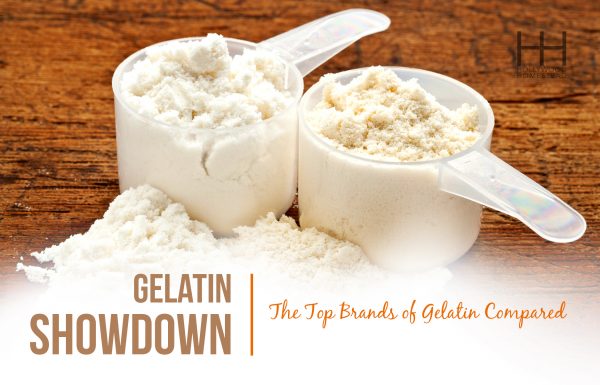
Gelatin has long been a favorite food but it was only fairly recently that people started talking about the health benefits of gelatin.
The word about gelatin spread quickly. As it did, new brands of gelatin started popping up – many marketing themselves with promises of better digestion, better skin, boosted immunity, and weight management.
Yes, all of these healthy benefits of gelatin really are true. But that doesn’t mean you can grab any brand of gelatin and expect to get benefits! As you probably know by now, quality matters. Gobbling down lots of chemically-processed gelatin isn’t going to do you much good.
If the gelatin brand contains harmful ingredients and additives, it might even do more harm than good!
Because there are so many brands of gelatin out there, I decided to focus on the most popular gelatin brands to see how they compare. I choose Jell-O Simply Good, Knox Gelatin, Great Lakes Kosher Gelatin, and Vital Proteins Beef Gelatin.
I’ll be looking at:
- Ingredients: To make sure there aren’t any harmful additives or preservatives being used.
- Gelatin Source: Gelatin made from factory farm animals will not be as nutritious. There may also be traces of hormones, antibiotics, GMOs, heavy metals, or chemical residues.
- Manufacturing Method: When gelatin is made using acidic chemicals and high heat, it kills the nutrients.
- Brand Reputation: The best brands of gelatin will disclose information about heavy metal contamination, nutrient profiles, and how their gelatin was made.
Contender 1: Jell-O Simply Good Gelatin
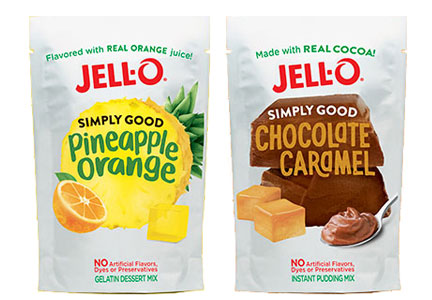
The American public is becoming a lot more aware about the risks of artificial flavors and colors. And, as they become more educated, food companies respond.
This is what happened with Jell-O. In response to concerns about toxic ingredients, they released a new line of Jell-O called Simply Good.
- Ingredients: The ingredients in Simply Good Jell-O are: Cane Sugar, Gelatin, Dried Orange Juice, Adipic Acid, Disodium Phosphate, Sodium Citrate, Fumaric Acid, Natural Flavor, Oleoresin Turmeric and Beet Juice.
As you can see, this is a big improvement over their regular Jell-O. I’m happy that they don’t have any more GMO sugar, artificial flavors, and BHA…
But there are still a lot of problematic ingredients here.
For starters, there is SUGAR. As Casey Thaler writes here, sugar is addictive, leads to insulin resistance, leads to heart disease, and might even cause dementia.
The other ingredients in Jell-O aren’t doing you any favors either. Disodium phosphate, for example, was declared hazardous by researchers.
- Gelatin Source: No information given about which animals used. Considering that Jell-O is owned by Kraft which has a terrible reputation for animal cruelty, using imported animal products, and using factory farmed animals, we can assume that the animals used for their gelatin were not grass-fed or pasture-raised.
Why does this matter? Because grass-fed, pasture-raised animals are more healthy and thus produce a more nutritious gelatin. Read more about why grass-fed matters here.
- Method of Production: No information is given about how the Jell-O is manufactured. Again, given what we know about Kraft and its mass-production methods, we can assume that Jell-O was produced using high-heat and other methods which destroy nutrients and affect quality. If this is not the case, I’d love to hear from Jell-O with a nutritional analysis!
- Reputation: Aside from Kraft’s bad reputation, Jell-O doesn’t publicly disclose any information about quality control testing, heavy metal contamination, or other contaminants. I personally don’t trust this brand.
The Verdict?
Don’t eat this stuff!
Contender 2: Knox Gelatine
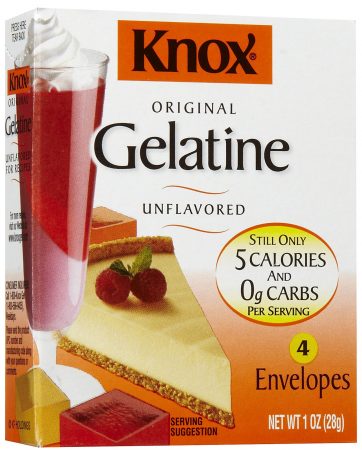
Knox is actually the original brand of gelatin and it has been around for over a century. This is the gelatin brand that we are most familiar with. Let’s see how it holds up…
- Ingredients: The only ingredient is gelatin. This is great as there are no additives.
- Gelatin Source: I reached out to Knox to ask what animals and animal parts they use in their gelatin. Their response was that they don’t know and I should contact Kraft for this information. As Meghan Birt notes, since Kraft is such a large company and uses mass-production methods, it is likely that the animals they use are living in factory farms. This means a gelatin which isn’t as nutritious and is probably contaminated with antibiotics, GMOs, and hormones.
- Method of Production: Knox also doesn’t give out any information about how they make their gelatin. Thus, I’d have to assume that they are using methods which destroy nutrients (such as the Type A acidic method and using high heat levels).
- Reputation: Knox has been around for a long time. However, they’ve changed ownership many times. Now, they are owned by the German company Associated Brands, a company which makes a lot of terrible junk food. No information is provided about quality control of Knox Gelatin. It is very possible that Knox Gelatin is contaminated with heavy metals.
The Verdict?
If you need to buy gelatin in the supermarket, Knox might be the best option on the shelves. Just don’t expect too much as far as health benefits go!
Contender 3: Great Lakes Kosher Gelatin
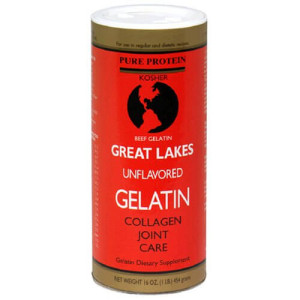
Great Lakes is the brand of gelatin that I’ve used for a long time and have gotten great results with. They also make a porcine gelatin which is a bit cheaper. However, since I’m not sure what the pigs were fed, I opt for the kosher (bovine) gelatin and that’s what we will look at here.
- Ingredients: The only ingredient is grass-fed beef gelatin! There are no additives to worry about here.
- Gelatin Source: Great Lakes uses cattle which are raised and slaughtered in Argentina and Brazil. The fact that they give this information is very assuring. The cattle are grass-fed, which probably means they are also pastured. Unfortunately, they don’t guarantee that their cattle are free of antibiotics, hormones, or herbicides and pesticides. However, they do test the hides to make sure none of these harmful substances make it into the final gelatin.
- Method of Production: According to their website, Great Lakes uses the Type B alkaline method of production. Thus, their gelatin is going to have a higher nutritional content. They even publish the amino acid content of their gelatin, which you can see here. This gives me confidence that Great Lakes is a high-quality product.
- Reputation: Great Lakes doesn’t use any flavors or additives. They also publish the test results of how much heavy metals are in their product. While they don’t seem to update the test results often or guarantee that there will never be any trace amounts of heavy metals, this information is more than most other brands of gelatin give – thus making it one of the most trustworthy gelatin brands.
The Verdict?
Great lakes is a very high-quality gelatin. The company is very transparent about their production methods and nutritional content of the gelatin. Great Lakes also has a good reputation for quality, which makes me feel confident recommending this product!
***You Can Buy Great Lakes Gelatin Here***
Contender 4: Vital Proteins Beef Gelatin
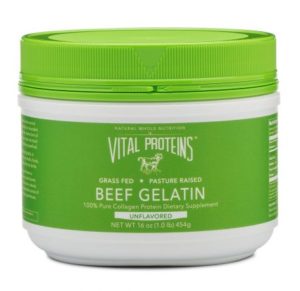
- Ingredients: The only ingredient here is grass-fed, pastured beef gelatin. This is one of the few gelatin brands which specifically lists that its gelatin is from pastured beef.
- Gelatin Source: Here is where Vital Proteins really stands out from the other brands. They not only say that their cattle are grass-fed and pastured, but tell you here on their website what type of cattle (Nelore breed), exactly where (Brazil) and even how much land each cattle gets (2.67 acres each). They are also in alignment with the Global Animal Partnership 5-step animal welfare rating standards. Because of the high standards which are used for raising the cattle, we can infer that the gelatin is a very high quality.
- Method of Production: Vital Proteins uses the Type 2 method of production and does not heat their gelatin above 190 degrees during production in order to keep more nutrients intact and improve taste. Other brands of gelatin do not give this much detailed information. If the other brands were being made with such a high-quality production method, they probably would brag about it. This leads me to believe that Vital Proteins is one of the best brands of gelatin available.
- Reputation: Vital Proteins tests each lot of their products for heavy metals and microbiological contaminants. The gelatin is only considered fit for sale if no heavy metals are detected. They will even send you a copy of their latest batch testing upon request.
The Verdict?
Vital Proteins is a very high-quality brand of gelatin and they are even willing to back up their quality claims with real test results and specific information about how their cattle are raised. This is more than I’ve seen of any other brand of gelatin.
***You Can Buy Vital Proteins Gelatin Here***
The Winner?
I feel completely confident with the quality of both Great Lakes Beef Gelatin and Vital Proteins Gelatin.
Vital Proteins does have more quality guarantees (and I like their packaging better). Unfortunately, this level of quality does mean that they cost a bit more.
If you can afford it, I’d go with Vital Proteins. But, if you want to save some money, Great Lakes is still a good choice.
Want to learn more about gelatin? Download The Gelatin Secret. You’ll get comprehensive information on the health benefits of gelatin, how to use it, and even lots of great gelatin recipes. Buy your copy here.
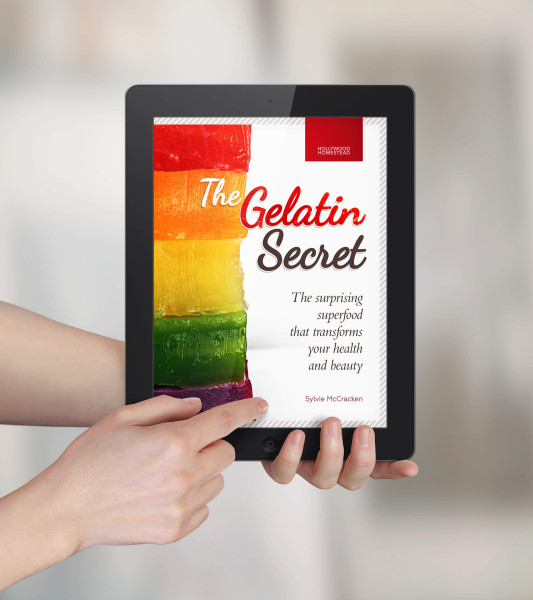

What brand of gelatin do you use? What results are you getting? I’d love to hear your thoughts on this in the comments!
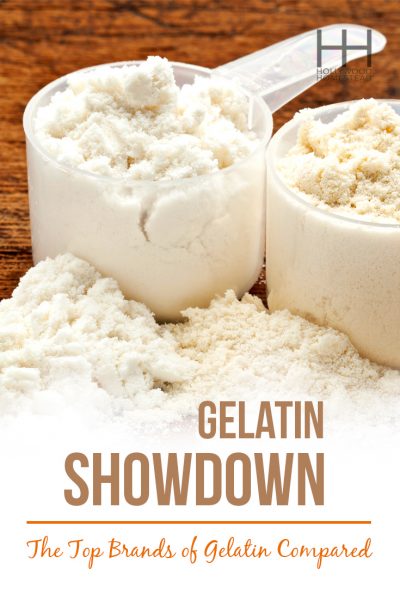
Latest posts by Sylvie McCracken (see all)
- Treating H. Pylori (Part 3): What H. Pylori Does to the Body - August 8, 2022
- Treating H. Pylori (Part 2): How H. Pylori is Contracted - August 3, 2022
- Understanding Beef Labels: Organic, Pastured, Grass-Fed & Grain-Finished - July 25, 2022
You need to expand your horizons – neither of these would I buy – both are over priced. I am using NOW gelatin and love it and it is more cost effective.
Which brand gelatin are you consuming? Thank you.
I think you’re making an awful lot of assumptions without information. Simply because Knox is not promoting information about the source of their gelatin does not mean it’s loaded with heavy metals, antibiotics, and contains totally feed-lot raised animals. The same holds for beef from Argentina and Brazil. The production facilities in both countries can be horrendous. Various rawhide products and dog food have been recalled as well as canned beef for botulism. We should also note that the process of making gelatin really breaks down the proteins and you have to wonder whether the sourcing is all that important for gelatin as it would be for say fresh meat. Knox makes good products and has been in the production business a long time. They may just be the best and most consistent for quality. It would be good if encourage them to open up on their production methods and sourcing. They might just sell more product!
If Knox is such a great product, why does their gelatin smell like decayed bodies and manure? I am not the only one that noticed that. Since most beef is now feedlot raised, the source is that unless stated otherwise. Besides the obvious stench and bad quality, Kraft owns Knox and is a company notorious for animal cruelty and poor quality. Stay away from their products unless you like poor health and promoting animal abuse!
It is quite disturbing how a company can claim to test for heavy metals and not allow any. I’m a dietician and I find that crazy. If a company has not a trace of Heavy metals, it can’t be an animal product. All animal products have natural occurring heavy metals. Vital Proteins is falsifying tests if they claim there are none. My vote is for Great Lakes. At least they tell the truth.
Hey, I have just started myself on Great Lakes. I’m not sure if this is normal but I started feeling almost feverish if I were to consume more than 1 tbsp a days. Any thoughts?
I’ve used Great Lakes, am going to try some from Perfect Supplements, and the Trim Healthy Mama Just Gelatin.
I’m a Vital Proteins girl. I love their gelatin for my recipes and gummies, and their collagen every morning in my coffee.
Have you looked at the packaged collagens available. I see them at whole foods. There seem to be 2 kinds.
Hi, This is an interesting comparison. Always used to use Knox. The last batch I bought smelled like manure and rot while I dissolved it. Kind of like a feedlot! Needless to say, that was the last box of Knox that’s going into my house!